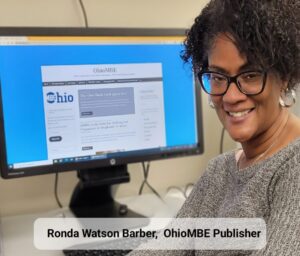Who will advocate for LEDE vendors?
by Ronda Watson Barber
OhioMBE Publisher
I was saddened and concerned about the Columbus School Board election that James Ragland recently lost. James was a champion for LEDE vendors. During board meetings, he challenged the state’s largest public school district on its purchasing practices with disadvantaged businesses. He was a vocal advocate for Black businesses. In his absence who will advocate for LEDE and Black-owned businesses?
Two of the three endorsed democrats and incumbents, Ramona Reyes and Michael Cole, rarely if ever publicly question why the district doesn’t meet its mandated purchasing goal of 20 percent or even speak on the district’s purchasing inclusion policy.
Ironically, in his day job, Cole is charged with assisting a majority construction company with meeting the State’s EDGE requirements on an Ohio State University construction project. Why don’t his efforts and commitment to disadvantage and Black-owned businesses continue with his elected position?
Why did the endorsed trio receive the Franklin County Democrats’ backing? Do Black-owned businesses matter to the Franklin County Democrats?
One board member, Carol Beckerle during a recent public meeting called the program by a different name. The inclusion program has been known for years as the L.E.D.E. program. She called it the lead program. I was listening to the board meeting and working. For a minute or two, I thought she was referencing “lead pipes” until she mentioned the Outreach Coordinators’ name. No one corrected her. It’s a bit difficult to support a program if you don’t know its name. When James was talking about the LEDE program during the meetings, did she know what he was speaking about? There appears to be a disconnect. Is the board on the same page when talking about district programs designed to establish and sustain diversity, inclusion and equity.
I will continue to question the district’s purchasing mission and motives; particularly where disadvantaged businesses and Black businesses are concerned. Why isn’t the district actively incorporating disadvantaged businesses in its purchasing scheme? The district has a race-neutral certification program. Businesses that participate in the Local Economically Disadvantaged Enterprises (LEDE) program have a net worth less than $750,000 not counting their primary residence and investment in the company. The business must be in Franklin County or 50 percent of the employees must reside in the district. The business must be in operation for at least one year.
The district has an equity policy as it pertains to LEDE companies but has no guidelines to back them up. The demoted COO, Maurice Oldham held his position for many years and never established guidelines for the program. Additionally, when he was the Custodial Supervisor, he didn’t meet the LEDE goals for his department.
The policy reads: The Board affirms its commitment to its “Equity Policy.” The School District seeks to include LEDEs in all aspects of its contracting for construction, professional and non-professional services and procurement of goods and supplies activities by adopting this statement (this “LEDE Statement”). Specifically, this LEDE Statement seeks to achieve the goal of awarding to LEDEs School District contracts and procurements which represent at least twenty percent (20%) of all dollars spent on an annual basis by the School District for contracting and procurement purposes (the “LEDE Participation Goal”). The School District is committed to ensuring that all citizens and/or lawfully admitted permanent residents in the School District community who are qualified contractors, subcontractors, professionals, suppliers, and other service providers have a fair and equitable opportunity to participate in the contracting and procurement activities of the School District.
Again, are those that are charged with procuring goods and services doing their best to include Black businesses? Last school year, 32 Black companies received $8.7 million in procurement while eight white companies received $9 million in contracts. Columbus City Schools spent 16 percent of its $121,808,261.92 spend with LEDE companies. Are Black LEDE businesses getting procurement scraps, while white firms get more lucrative contracts?
Are there purchasing policies enacted to prevent Black-owned businesses from becoming a vendor with the district? Columbus City Schools is the only public entity in Central Ohio to require vendors to have general liability insurance to register as a vendor. This practice was enacted by the former purchasing director who sued the district because they didn’t rehire him after he retired and won a $70,000 settlement (more in the next issue on that hot mess, as I am the only one in the lawsuit who didn’t sign a confidentiality clause).
The district will not forward bid notices to vendors who don’t have a current W-9 and general liability insurance on file.
Are LEDE businesses at the forefront of thought when purchasing decisions are made? Why is legislation forwarded to the elected board without LEDE participation? Why does the elected board vote for legislation that does not include LEDE participation? Former Board President Stephanie Hightower earned the tough reputation of sending the legislation back, if it didn’t include LEDE businesses. She demonstrated her commitment to the inclusion program and local businesses.
We are told to use our vote to make changes. The changes in the Columbus City School Board may be a continued detriment to Black companies. What are the next steps? How do we get the Columbus School Board to live up to its policy of purchasing inclusion when it is not an issue of importance to them?
Just my thoughts…rwb

